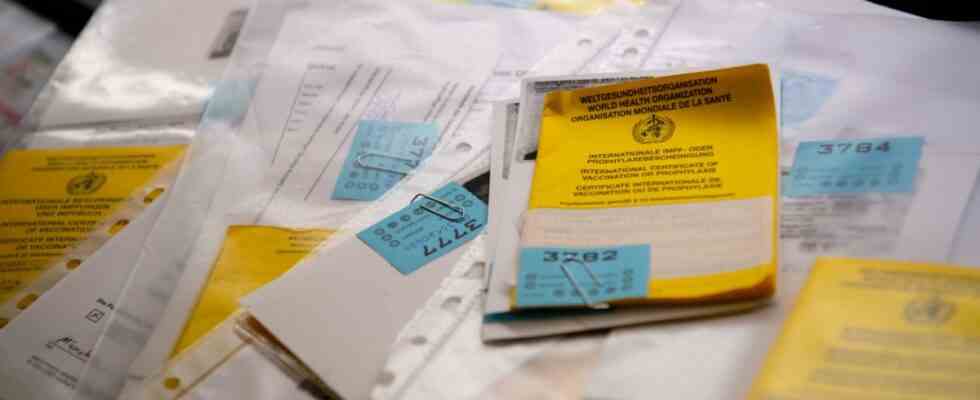The case is clear, the defendant admitted it: More than a year ago, he obtained a fake vaccination card with a stamp from the Stuttgart Clinic and a batch number of the vaccine that, according to investigations in the clinic, had not been vaccinated for the period specified in the vaccination card is. The district court in Kaufbeuren therefore sentenced the trained electrician to a fine of 4,800 euros, which the 63-year-old did not want to let stand.
Use of incorrect health certificates, forgery of documents, on Monday and Tuesday alone, the Kempten district court heard six such cases in chords: 9 a.m. to 10.30 a.m., 10.30 a.m. to 12 p.m., on Tuesday until late afternoon. The Bavarian Ministry of Justice reports that there is no statistical data on completed or ongoing proceedings regarding counterfeit vaccination cards in Bavaria. A spokesman for the Bavarian State Criminal Police Office in Munich, however, speaks of 6,000 investigations, regardless of whether it is about vaccination cards or digital proof of Covid 19 vaccinations. The Bavarian courts all over the country had a lot to do, they are still processing the counterfeits, which hardly anyone needs anymore because the restrictions have been lifted – which is exactly why there are now fewer lawsuits.
At the beginning of his appeal hearing, the electrician in the Kempten district court has his lawyer explain that he admits having presented his fake vaccination certificate in a pharmacy in Kaufbeuren in order to receive an electronic certificate. However, the pharmacy employee became suspicious, so the investigation took its course. In the courtroom, however, the man withdrew his appeal and accepted the fine imposed by the district court.
The judge could not have convicted him of the original allegation of “using incorrect health certificates”. According to a decision by the Federal Court of Justice, he should have presented the fake vaccination card to an authority, which does not include a pharmacy. However, the judge warned that the 63-year-old would then have been exposed to lengthy investigations into whether there was a forgery of documents instead – in contrast to the original allegation, not only a fine or up to one year in prison, but a fine or up to five years in prison could be punished.
More than 1000 fake vaccination cards
There have been many convictions in recent months, including some spectacular ones, such as against counterfeiters of vaccination cards. In Munich, for example, a pharmacy employee has been sentenced to three years in prison for more than 1,000 false vaccination cards. The court saw it as proven that she had falsified vaccination cards for several months. Her accomplice sold the documents on the dark web, and he is said to have earned more than 130,000 euros in total. He has to go to prison for four years.
“The Bavarian judiciary is taking decisive action against counterfeit vaccination cards. The perpetrators risk infections and, in individual cases, human lives,” says the Bavarian Minister of Justice Georg Eisenreich (CSU). Investigations into individual counterfeit vaccination cards often started in pharmacies, as in the case from Kaufbeuren: New vaccination cards that only contain entries for corona vaccinations are striking. Or the batch number does not match the vaccine, the vaccination intervals do not match the Stiko recommendation. Sometimes pharmacists also turned on the police because a vaccination was supposedly administered by a family doctor – but at that time vaccinations were still only available in vaccination centers.
In a second appeal at the Kempten district court on Monday, a young man admitted to having presented a false vaccination certificate in a pharmacy. He received it from an acquaintance, believing that the entries there actually came from a family doctor. However, the investigation revealed that this family doctor never issued the document, that he does not even use a stamp like the one shown on the ID card. The defense attorney nevertheless pleads for acquittal because his client, who has actually been vaccinated in the meantime, knew that he had not received any vaccinations at that time, but believed that he was applying for a vaccination certificate at the pharmacy with an ID card correctly issued by a doctor – in this respect no intentional vaccination certificate could be given to him to be accused of forgery. The judge rejected this line of argument and lifted the judgment of the district court, but sentenced the accused to a fine of 5,850 euros for forgery of documents.

